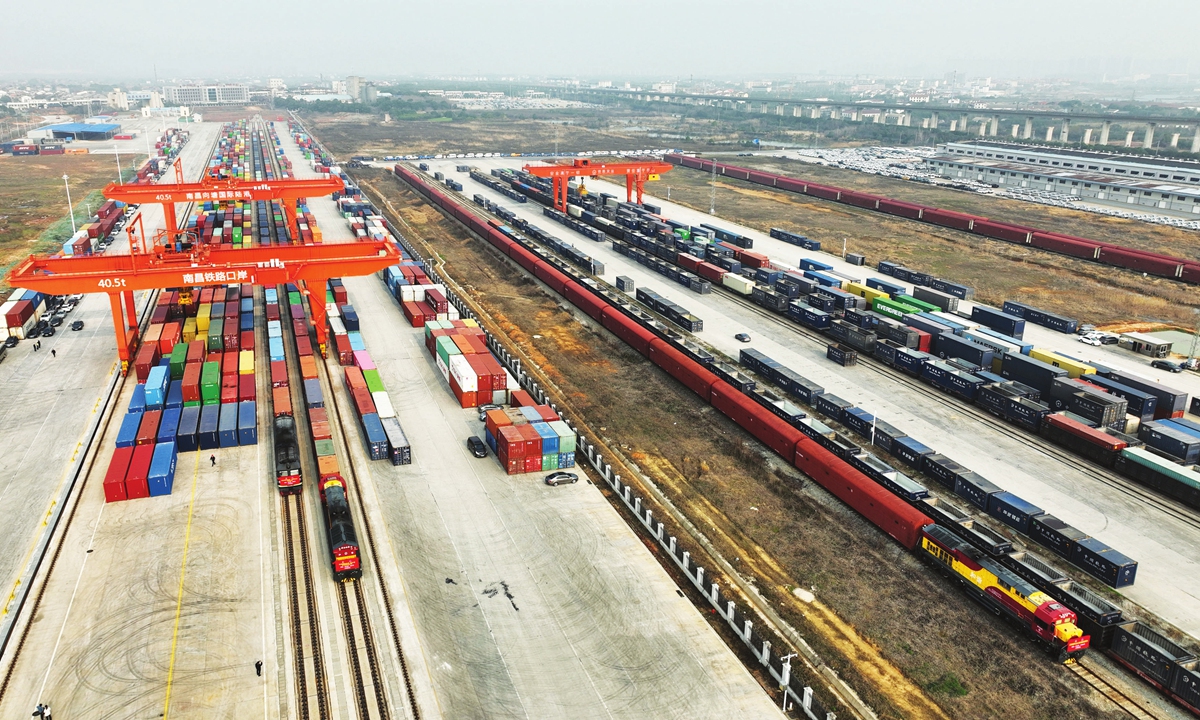
Three freight trains including a China-Europe freight train dedicated to "Silk Road" e-commerce depart from Nanchang city, East China's Jiangxi Province on March 2, 2023. The "Silk Road" e-commerce freight train departed from Nanchang to Moscow via Manzhouli port in North China's Inner Mongolia Autonomous Region. Photo: cnsphoto
As attacks on ships along the key Red Sea shipping route continue to affect global maritime commerce, some Chinese exporters are shifting to China-Europe Railway Express services to ensure timely delivery of their goods and avoid staggering operational costs if they navigate around the Cape of Good Hope.
Industry observers said that more companies in China and Europe are expected to choose rail services, which will help stabilize fractured global supply chains amid mounting uncertainty.
"Many people have been asking about China-Europe freight trains after the Red Sea attacks. The number of inquiries has doubled since these incidents began," Tommy Tan, president of Shanghai EPU Supply Chain Management Co, told the Global Times on Thursday.
Tan said that business for these trains, which will be more reliable than sea transport, may further increase in the coming months.
"We are actively preparing route configurations and increasing capacity for round-trip services to meet growing customer demand," he said, noting that major platform companies have started increasing their allocations to Europe, and freight rates are also rising.
The short-term impact of the Red Sea crisis is significant, especially with multiple shipping companies announcing the suspension of services to ports such as Haifa, Ashdod and Jeddah, Zhong Zhechao, founder of One Shipping, an international logistics service consulting firm, told the Global Times.
Since the Red Sea crisis began, most first-tier shipping companies have diverted their routes around the Cape of Good Hope. Customers involved in China-European trade now face additional costs and a delay of seven to 10 days in such cases, the Global Times learned from several industry insiders.
Global shippers have diverted about $80 billion worth of cargo away from the
Red Sea amid security concerns. As of Wednesday morning, around 121 container vessels were sailing the long way around Africa instead of cutting through the Red Sea and the Suez Canal, CNBC reported.
Leading global shippers, including Denmark's Maersk Line and Germany's Hapag-Lloyd AG as well as Chinese shipping giants like COSCO and Orient Overseas Container Line, have reportedly suspended transport through the Red Sea.
Some rail freight platform companies have proposed price increases for their railway services to Europe, possibly based on a significant predicted increase in rail cargo volume, Tan said.
A Zhejiang transport official overseeing the development of China-Europe freight train services told the Global Times on Thursday that a significant number of vendors that are failing to meet their delivery deadlines for European customers have shifted to the China-Europe freight trains in recent days.
"If the situation in the Red Sea continues, it is certain that the shift will gain momentum," the official surnamed Zhang said. "It is a typical example demonstrating the strategic value of the China-Europe freight trains as the overland connection provides an alternative to seaborne trade and boosts the resilience of cross-continental trade."
In terms of efficiency, railways have a clear advantage over sea transport. With a decade of high-quality development, China-European freight trains take about 12 days, compared with the normal sea transit time of 35 to 45 days.
In terms of cost, rail freight is only slightly more expensive than sea transport, especially as the differential narrows after rerouting via the longer Cape of Good Hope route.
As an important channel to increase connectivity between China and partner countries and regions along the Belt and Road Initiative (BRI), the role of the China-Europe Railway Express in ensuring global logistics security and stability is prominent amid rising geopolitics and US-led decoupling attempt, Song Wei, a professor at the School of International Relations and Diplomacy at Beijing Foreign Studies University, told the Global Times on Thursday.
The China-Europe Railway Express operated a total of 16,145 trains in the first 11 months of this year, up 7 percent year-on-year. A total of 1.75 million 20-foot equivalent containers of goods were carried, up 19 percent year-on-year, according to China State Railway Group Co.
The China-Europe Railway Express services reach 217 cities across 25 European nations, according to the company.
"Along with the development of the BRI and strengthening China-Europe economic and trade exchanges, the China-Europe Railway Express is expected to play a larger role in the future," Song said, noting that China will expand logistics and supply chain cooperation with more countries and regions.
The Red Sea is an important international trade route, and maintaining security and stability in the region is in the common interest of the international community. China has always advocated for the security of international waterways and opposes any acts of attacking civilian vessels, Chinese Foreign Ministry spokesperson Wang Wenbin said at a regular press briefing on Thursday.
All parties, especially influential major countries, should play a constructive and responsible role in maintaining the security of the Red Sea shipping lanes, Wang said.




